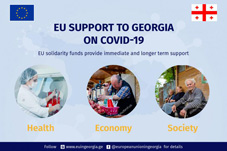
EU to allocate Euro 20 million for Georgia's fight against Coronavirus
By Natalia Kochiashvili
Wednesday, April 1
On March 30th, the European Commission announced in Brussels an extraordinary package of robust assistance to Georgia and the Eastern Partnership region to help them handle the challenges of the Coronavirus crisis.
For Georgia, it means over Euro20million in new emergency allocations in addition to redirection of over Euro70million of ongoing programmes for crisis response and access to multiple regional funds.
Oliver Varhelyi, Commissioner for Neighbourhood and Enlargement Negotiations said: “These are very difficult times not only for the EU, but for our partner countries, such as Georgia, as well. We have to do what we can to mitigate the impact of the Coronavirus outbreak on human lives and livelihoods.”
According to Varhelyi, the package responds both to the immediate needs of the health systems, as well as a longer term needs to the most vulnerable groups in society and small and medium-sized enterprises, which are the backbone of the economies in the 6 countries.
EU Ambassador to Georgia H.E. Carl Hartzell also reaffirmed the EU's support in these challenging times: “With the solidarity package we hope and trust to make a tangible contribution to the ongoing hard work of the Georgian government and population.”
For immediate response, the EU will provide Euro30 million to the World Health Organisation (WHO) for the purchase of medical devices and personal equipment, such as ventilators, laboratory kits, masks, goggles, gowns, and safety suits for the 6 Eastern Partnership countries. The support will also be provided for training of medical and laboratory staff and awareness raising measures to the wider population. The exact allocation per country will be decided in the coming weeks based on country needs assessments conducted by WHO.
In addition, the EU will provide micro-level assistance: A Georgian producer of medical textiles was already able to produce 40,000 medical gowns within a week after receiving equipment by the EU and Germany.
The funds will be activated so that civil society organisations (CSOs) in Georgia can provide the most vulnerable groups additional ways to cope with the crisis. The EU has made available more than Euro11.3 million in small grants to CSOs across the Eastern Partnership region. These funds are already responding to immediate needs through the regional Rapid Response Mechanism.
In addition, CSOs can already start applying for Euro4 million in grants for activities in crucial areas such as social entrepreneurship, social services and human rights.
As for the mitigating the socio-economic impact in Georgia, together with International Financial Institutions (IFIs) and relevant financing institutions from Member States, the EU will provide a coordinated European response for the real economy through supporting notably small and medium-sized enterprises (SMEs):
At least Euro70 million in grants will be redirected to assist Georgian businesses and those who are self-employed to easily access local currency credit lines and grants to boost and help recover their businesses after the crisis. Funds will be provided through financial partners, and become available throughout 2020.
Close to Euro20 million in localised grant funding will aim supporting local business, farmers and individuals to gain skills, and develop their businesses or recover from the crisis launched throughout 2020.
On the micro level, EU projects are currently providing legal advice to small businesses that are relevant to fighting the pandemic.
In addition, the EU has mobilised its European Fund for Sustainable Development (EFSD), which will rapidly provide financial support in key areas such as working capital, trade finance, or moratoria on debt service, through our IFI partners.
The Commission also stands ready to provide assistance to Georgia through TAIEX, by using EU Member States expertise, experience and examples of good practice to assess emergency preparedness response schemes and health systems.
This support is part of a larger Eastern Partnership support package, which includes Euro140 million in new allocations and up to Euro700 million redirected funds and guarantees for the six Eastern Partnership countries: Armenia, Azerbaijan, Belarus, Georgia, Moldova, Ukraine.
There are over a hundred confirmed cases of coronavirus in the country at this stage in Georgia - 20 of which have already recovered.


